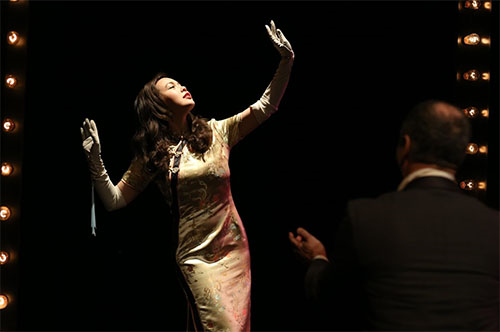By ERIC GRODE
Move over, August Wilson. Damon Chua is halfway toward replicating your century-spanning theatre project.
True, Chua doesn't focus on one specific geographic area, à la Wilson's beloved Hill District of Pittsburgh. And the definition of "century" got a little fuzzy when he set one of his plays in the 2000s. "Also, I didn't plan this, but I seem to be strongly drawn to the even-numbered decades," says Chua, who is taking on the 1980s in a new work commissioned by the Public Theater.
Then again, August Wilson didn't juggle an administrative role at an acclaimed off-Broadway theatre company, as Chua did when he spent two years as executive director at the Keen Company. "My career has been kind of strange," he says. "There are periods in my life that are more business-focused and parts that are more creative."
Film Chinois, Chua's latest creative effort, fits both the every-other-decade template (it's set in 1947) and the playwright's taste for far-flung locales (Beijing, known at the time as Peking). It's currently at Theatre Row in a production from Pan Asian Repertory Theatre, and it offers his latest refraction of cultural identity through time-honored genre tropes.
This time the Singapore-born Chua---who in the past has explored the complexities of the counterculture in the psychedelia-tinged, 1960s-set Dark Sides of the Moon---uses the shady assignations and murky motivations of film noir to cast light as well as shadows on his parable of U.S.-Chinese relations and codependence.
The lighting and costume requirements alone would have given Chua pause if Film Chinois had crossed his desk as an administrator. "Yeah, if I were the person making the decision, I would have said, 'This is going to cost too much to produce.' Luckily, Pan Asian Rep didn't see it that way."
Chua has set the play at a particularly tumultuous time in Chinese history: 1947 falls halfway between the end of World War II and the rise of the Chinese Communist Party. "I really wanted to show the uncertainty around Peking at that time," Chua says, and film noir was a logical prism through which to view it. "Everybody's hiding something, and that's what film noir is all about." In fact, the idea of juxtaposing that genre with that setting was so appealing that Chua took the unusual step (for him) of starting with a title and working from there.
This process began in 2007, making it the first play Chua worked on upon moving to the United States. It had a well-received run in Los Angeles, but he has since revised Film Chinois extensively. "It's a little bit less mysterious and less wordy now," he says.
Chua also watched a bunch of noir to make sure he stayed true to the era---Sunset Boulevard is a particular favorite---and Film Chinois abounds with femmes fatales, shady ambassadors, and a long-lost reel of film. Any suggestions for similarly trenchant genres intrinsic to the 1910s, 1930s, 1950s, 1970s, and 1990s would be welcome.
---
Eric Grode is a freelance arts writer and a professor at Syracuse University's Goldring Arts Journalism Program
Photo by John Quincy Lee
.
